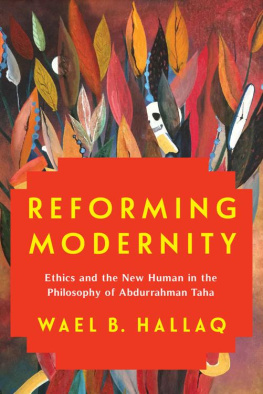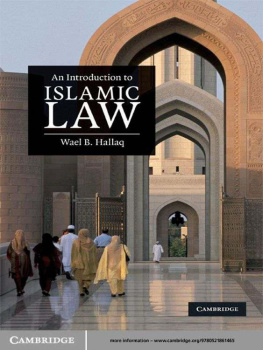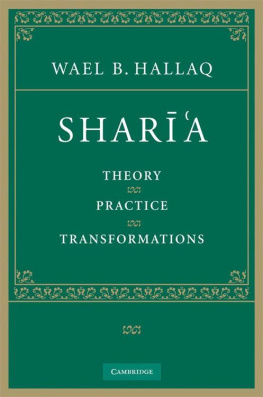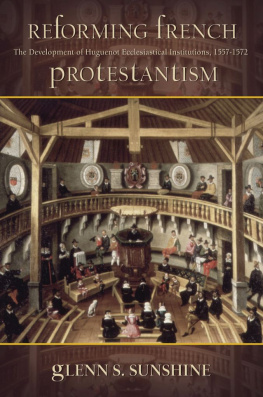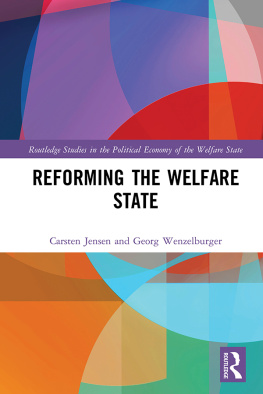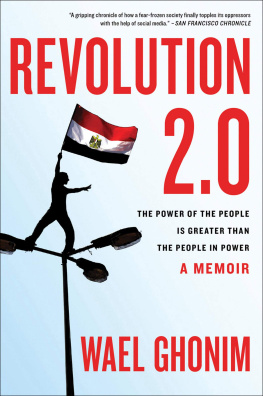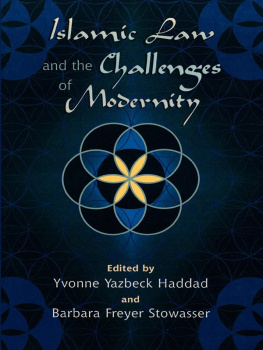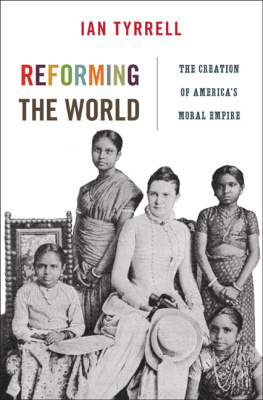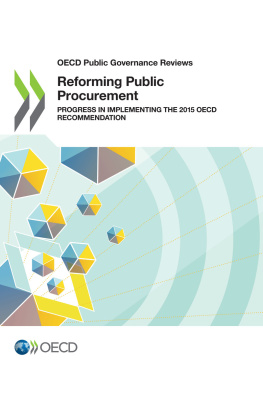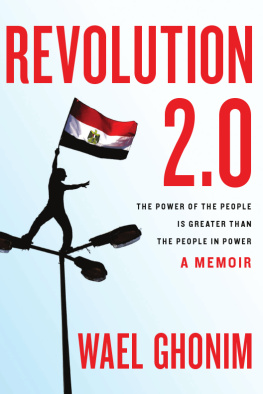Wael B. Hallaq - Reforming Modernity
Here you can read online Wael B. Hallaq - Reforming Modernity full text of the book (entire story) in english for free. Download pdf and epub, get meaning, cover and reviews about this ebook. year: 2019, publisher: Columbia University Press, genre: Romance novel. Description of the work, (preface) as well as reviews are available. Best literature library LitArk.com created for fans of good reading and offers a wide selection of genres:
Romance novel
Science fiction
Adventure
Detective
Science
History
Home and family
Prose
Art
Politics
Computer
Non-fiction
Religion
Business
Children
Humor
Choose a favorite category and find really read worthwhile books. Enjoy immersion in the world of imagination, feel the emotions of the characters or learn something new for yourself, make an fascinating discovery.
- Book:Reforming Modernity
- Author:
- Publisher:Columbia University Press
- Genre:
- Year:2019
- Rating:4 / 5
- Favourites:Add to favourites
- Your mark:
- 80
- 1
- 2
- 3
- 4
- 5
Reforming Modernity: summary, description and annotation
We offer to read an annotation, description, summary or preface (depends on what the author of the book "Reforming Modernity" wrote himself). If you haven't found the necessary information about the book — write in the comments, we will try to find it.
Reforming Modernity — read online for free the complete book (whole text) full work
Below is the text of the book, divided by pages. System saving the place of the last page read, allows you to conveniently read the book "Reforming Modernity" online for free, without having to search again every time where you left off. Put a bookmark, and you can go to the page where you finished reading at any time.
Font size:
Interval:
Bookmark:
Reforming Modernity
REFORMING MODERNITY
Ethics and the New Human in the Philosophy of Abdurrahman Taha
WAEL B. HALLAQ

COLUMBIA UNIVERSITY PRESS NEW YORK
Columbia University Press
Publishers Since 1893
New York Chichester, West Sussex
cup.columbia.edu
Copyright 2019 Columbia University Press
All rights reserved
E-ISBN 978-0-231-55055-0
Library of Congress Cataloging-in-Publication Data
Names: Hallaq, Wael B., 1955 author.
Title: Reforming modernity : ethics and the new human in the philosophy of Abdurrahman Taha / Wael Hallaq.
Description: New York : Columbia University Press, 2019. | Includes bibliographical references and index.
Identifiers: LCCN 2019006303 | ISBN 9780231193887 (cloth)
Subjects: LCSH: Abd al-Ramn, h. | Philosophy, Arab20th century. | Religion and ethics.
Classification: LCC B5364.A2334 H35 2019 | DDC 199/.64dc23
LC record available at https://lccn.loc.gov/2019006303
A Columbia University Press E-book.
CUP would be pleased to hear about your reading experience with this e-book at .
Cover design: Noah Arlow
For Lena and Cherine

There is no humanity without ethics.
Sul al-Akhlq, 147
Contents
Wherever a citation in round brackets appears in the body of the main text (e.g., RD , 473), it invariably refers to Tahas work. Transliterated phrases and passages quoted from Tahas writings will appear, with relevant page citations, in the endnotes, along with all other references. Works that have not been extensively analyzed are cited with unabbreviated titles.
AD: Al-Amal al-Dn wa-Tajdd al-Aql [ Religious Praxis and the Renewal of Reason ], 4th ed. Casablanca: al-Markaz al-Thaqf al-Arab, 2006.
HAF: al-aqq al-Arab fil-Ikhtilf al-Falsaf [ The Arab Right to Philosophical Difference ], 2nd ed. Casablanca: al-Markaz al-Thaqf al-Arab, 2006.
HIF: al-aqq al-Islm fil-Ikhtilf al-Fikr [ The Islamic Right to Intellectual Difference ]. Casablanca: al-Markaz al-Thaqf al-Arab, 2005.
KNN: Kayfa Nujaddid al-Naar fil-Turth [How Do We Rethink Tradition], in SM , 4157.
RD: R al-Dn: Min q al-Almniyya il Siat al-Itimniyya [ The Spirit of Religion: From the Narrowness of Secularism to the Capaciousness of Trusteeship ]. Casablanca: al-Markaz al-Thaqf al-Arab, 2012.
RH: R al-adtha: al-Madkhal il Tass al-adtha al-Islmiyya [ The Spirit of Modernity: A Prolegomenon to Laying the Foundations of Islamic Modernity ]. Casablanca: al-Markaz al-Thaqf al-Arab, 2006.
SA: Sul al-Akhlq: Mushama fil-Naqd al-Akhlq lil-adtha al-Gharbiyya [ The Question of Ethics: A Contribution to an Ethical Critique of Western Modernity ]. Casablanca: al-Markaz al-Thaqf al-Arab, 2000 .
SM: Sul al-Manhaj: F Ufuq al-Tass li-Unmdhaj Fikr Jadd [ The Question of Method: Toward a New Intellectual Paradigm ]. Edited by Rawn Marm. Beirut: al-Muassasa al-Arabiyya lil-Fikr wal-Ibd, 2015.
SU : Sul al-Unf: Bayna al-Itimniyya wal-iwriyya [ The Question of Violence: Between Trusteeship and Dialogue ]. Beirut: al-Muassasa al-Arabiyya lil-Fikr wal-Ibd, 2017.
TM: Tajdd al-Manhaj f Taqwm al-Turth [ Renewal of Method for the Rectification of Tradition ], 3rd ed. Casablanca: al-Markaz al-Thaqf al-Arab, 2007.
UNIT : Al-Ul al-Naariyya al-Takmuliyya fil-Ishtighl bil-Turth [The Foundations of a Theory of Integral Unity in the Study of Tradition], in SM , 5970.
Abdurrahman Taha is one of the most significant philosophers that the world of Islam has produced since colonialism set foot in Afro-Asia. Still in progress, his project departs from, but leaves behind, the epistemological grounds in which the great majority of modern Muslim intellectuals have anchored their own programs of so-called reform. The general trend that begins with Burus al-Bustn, Muammad Abduh, and Fara Ann at the end of the nineteenth century, ushers in the Naha (Awakening), and culminates in the Arab world in such figures as Muhammad Arkoun, Nar mid Ab Zayd, and Muammad bid al-Jbr is altogether abandoned. While the Naha has been dominated by nationalism, Marxism, secularism, political Islamism, and liberalism, Tahas philosophical program embraces a systematic rejection of these epistemologies and modes of thought. But reasoned rejection of these movements is only the stepping-stone to his project. If rejection is the negativeor, shall we say, deconstructivedimension of his system of thought, then the positive dimension is a constructive one, where alternatives are proffered with force and systematic virtuosity.
Over the past two and a half decades in particular, Taha has published one outstanding book after another, most remarkable for a philosopher who wrote relatively little during the first fifty years or so of his life. His worksnow over twenty in allcover incredibly vast terrains, addressing a variety of topics (linguistics, logic, ontology, reason, humility, violence, materialism, theology, dialectics and dialogue, even a philosophy of attirement). In spite of the breadth of his interests, the thread that runs throughout the entirety of Tahas philosophical fabric, wholly making up its warp and woof, is indisputably the ethical thread. In all of its varied dimensions and directions, his project remains squarely lodged within what we generally call moral philosophy.
This book focuses precisely on this thread, as Taha weaves it into his discursive engagement with the central questions that plague modernity both in the West and in his own Muslim lands, both taken not as geographical signifiers but as epistemological formations of the first degree. To write about anything central is also not to write about many other things, which, however important they may be, must be relegated to the margins. I cannot claim that this book captures Tahas vast project in all or even most of its dimensions, but I have the confident hope that what I say here exposes the central nerves by which his system of thought operates. Put differently, and in justification of writing about a deep thinker who is still active, this book treats the vital membranes that make his project not only possible but also what it is. Change the constitution of these membranes, and the project would categorically cease to be identifiable in the manner we recognize it now. Which is also to say that although the project is ongoing, there is already a formidable body of thought that is recognizable as a unique contribution to ethics, one that we must begin to reckon with.
I should also make it clear at the outset that the astounding caliber of this thinker is not the only reason his work has commanded my attention. Tahas project is relevant to me because it navigates the same terrains and waters that have become the focus of my interest over the past two decades. The concluding part of this book, I think, adequately demonstrates the commonality between our projects, and it is with this in mind that the book should be read and interpreted. It is my hope that, whatever critique I deploy in scrutinizing his writings, it is one that is fair and faithful to the central tenets of his own project, which I deem, on the whole, to be sound and highly defensible. This is also to say that in my critique of his work, I continue my own deliberations that began with Shara: Theory, Practice, Transformations (2009) and that continued with The Impossible State (2013) and Restating Orientalism (2018). Any adequate appreciation of this critique presupposes close familiarity with these works.
A caveat is in order, however. I take it for granted that no work or oeuvre is immune to critique, and to the extent that I regard certain issues and arguments in Taha as likewise central to my own concerns, I have attempted to point to the different ways that one might approach them critically. While this evidently represents my own engagement with Taha, I have chosen not to debate him on a variety of issues otherwise deserving of analytical and critical attention. One reason for this is my intention of presenting his work without constant interruption by my critical presence. Insofar as the translation of a philosophical oeuvre onto a foreign conceptual soil is at all feasible or justifiable (a risky and difficult task, I am fully aware), I have attempted this translation at the expense of what I hope to be a minimal interference. With this desideratum in mind, I have left a list of questions and issues without critical engagement, although on a number of important others I found it necessary to break this standard. My justification for this partial neutrality is that the list, at least with regard to my own interests, may stand on its own without adverse effects on what I deem central and crucial to his ethical project. I hope that the present contribution will open up ample space for engaging this philosophers work on important and timely questions, subjecting them to a fruitful and productive critique. To say that his oeuvre requires multiple monographic interventions is to state the obvious.
Next pageFont size:
Interval:
Bookmark:
Similar books «Reforming Modernity»
Look at similar books to Reforming Modernity. We have selected literature similar in name and meaning in the hope of providing readers with more options to find new, interesting, not yet read works.
Discussion, reviews of the book Reforming Modernity and just readers' own opinions. Leave your comments, write what you think about the work, its meaning or the main characters. Specify what exactly you liked and what you didn't like, and why you think so.

